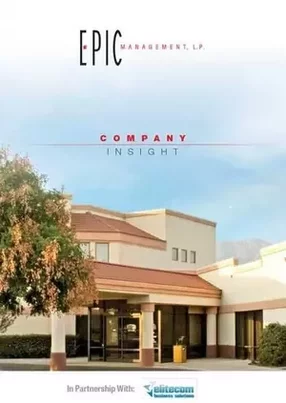EPIC Management: The technology that's giving doctors more time with their patients
As well as providing a wide range of administrative services to healthcare provider clinics in Southern California, EPIC Management's implementation of new technology is saving doctors valuable time so they can spend it with their patients.
Owned by the long-established Beaver Medical Group, EPIC Management LP is a management service organization that serves as the group's administration arm. It provides a range of administrative and support services including contracting, finance, clinical and operations support and staffing, business development, information services, human resources, marketing, claims, billing, supply chain, and facilities management to 27 clinical sites across the Inland Empire region of southern California.
EPIC Management provides services for a wide range of small to large physician practice groups and IPA’s. In total, EPIC's clients include over 300 physicians and 1,300 employees.
Since it was founded in 1995, EPIC has attained a market leading track record of developing and managing high quality healthcare services for their clients. Its services make it possible for doctors to focus on their patients while benefiting from the company's administrative and operating strength.
Time-saving tech
One initiative that's proven extremely beneficial has been the implementation of automated scanners for supply replenishment, a system that enables the barcoded inventory storeroom to be easily categorized and managed. Using the Opticon Scanner system in conjunction with the McKesson Medical Surgical online supply manager platform, replenishing and ordering of supplies is now truly automated. At no cost under a Medical Distribution agreement, the Scanner and Barcode system interfaces directly with the Online requisition software platform. Before this was introduced, to re-stock medical supplies in storerooms, nurses and clinicians had to place orders using paper.
Jason Gateas, the Executive Director of Supply Chain Management, oversaw the move from this system into online requisitioning. Two years ago he introduced the use of the Opticon scanner which barcodes every single item making the process of replacing clinical supplies much faster, saving the time it takes to replenish supplies in the clinical setting.
It took about a year and a half to roll it out to all the clinical sites but it means that now all the medical and non-medical products are documented onto a computer. The only items this doesn't apply to are pharmaceutical items as these are kept in controlled environments.
Then, when it comes to ordering, clinicians simply enter the quantity they need based on the shelf levels. "All they [clinicians] do is press a button and that online requisition goes to purchasing," Gateas explains. "It takes 50 per cent less time to replenish supplies."
Although this system hasn't impacted EPIC in terms of a hard cost savings, Gateas explains the savings are invaluable for the medical staff in the reduced time it takes in managing critical medical supplies.
"As far as the contracting cost goes it doesn't affect us," he says. "What it does affect is the soft savings cost as far as the back-office time and supplies, so it gives that time back to the clinicians to do important clinical work and better attend to their patients."
There is a difference between the big health groups and smaller practices and hospitals.
Gateas explains: "Larger medical groups are more technology-savvy and more complex when you're dealing with aggregate volumes, vs. the smaller clinics that don't have the same time and resources for complex software systems"
He says the latter can be a challenge however also a benefit if managed correctly and where Supply Chain Management acts as a professional consultant to the clinical teams. Change management utilizing a Lean management process combined with technology usually leads to a win-win scenario for the clinical and administrative teams.
Looking ahead
The main challenge, however, is to keep up the efficiency of this system. "It's an on-going training process, he says. “You have staff turnover. Tracking and managing inventory more efficiently and accurately will lead to more informed purchasing contracts with manufacturers. The maintenance is the challenging part."
As far as EPIC's market goes, it's currently servicing over a dozen sites that provide care to more than 150,000 patients in the Inland Empire region of the Southern California marketplace

